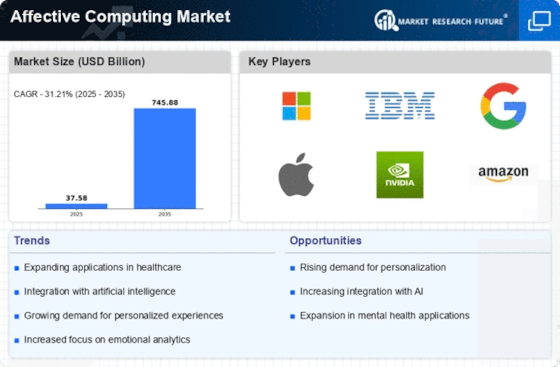Market Trends
Key Emerging Trends in the Affective Computing Market
The Affective Computing market is undergoing tremendous growth and development due to the high demand for emotionally intelligence applications by the diverse enterprises. The recognition, decryption, and processing of human emotions is one of the skills of affective computing which is a kind of artificial intelligence that enhances the ability of machines to express and interpret emotions.
The Affective Computing Market is characterised by one of its major user trends which is its widening application in customer driven projects such as retail and customer care. Leaders in technology are now exercising artificial intelligence to provide better services to customers by developing systems that quickly identify and respond to client emotion. This allows organizations to personalize their administrations and products to appropriately meet customer mood and as a result, it will lead to a promotion of loyalty and dedication.
In the same vein, computational psychology has been introduced to provide support rehabilitation and monitoring of stress levels. How people will observe or use artificial intelligence to analyze signs and looks, including the person's voice, eyes, and other physiological signs to survey their close-to-home health. This has unveiled especially appealing in remote patient monitoring and provision of tailor-made emotional support, especially when in-person counseling is limited due to accessibility barriers.
As for educational area, affective computing is quickly becoming popular in terms of creating tailor-made growth opportunities. Implementing artificial intelligence integrates platforms that can measure the states of students and customize the educational content according to their necessities. These frameworks can notice the levels of disappointment, tiredness or commitment. Then they adjust the game play, level of trouble or content in order to make the education experience as good as it can be. Learning to teach means nothing better than replacing the existing methods of teaching with those that are adjusted to each student's emotional state.
Another dominant way that the Affective Computing market is evolving may be classified as the figure of artifical intelligence into human-machine interfaces. This encompasses with devices abilities such as artificial intelligence being integrated into gadgets like smart phones, wearables, and home automation. Through knowing how people feel, these gadgets can create more human-centric interactions and be so responsive that they will definitely be part of our everyday life.
Additionally, the shift and related businesses have also substantially incorporated emotional computing in an attempt to improve the user experience. A good example is when people look forward artificial intelligence to create more realistic and diverse content what will affect the outcome or interaction based on the player's personal perspectives. It lends diversion one more dimension while giving artists a way of appealing to the audience through a different style of storytelling.


















Leave a Comment